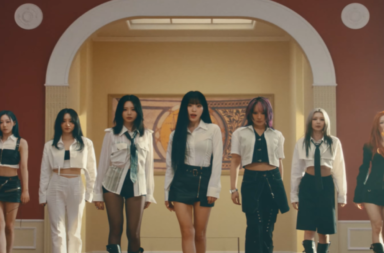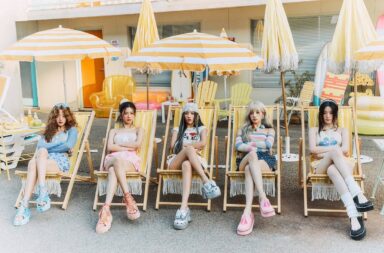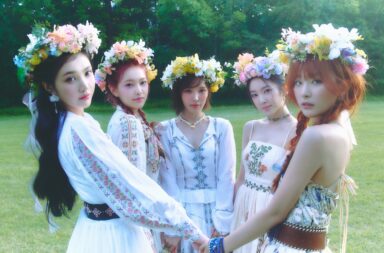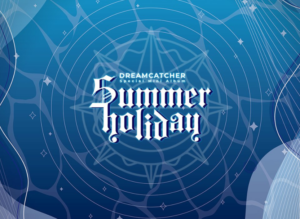
Dreamcatcher are something of an outlier in the current K-pop girl group landscape. Famous for a heavy, rock-inspired sound and theatrical, almost gothic concepts, theirs is music that is easy to distinguish just about anywhere. So, when you hear that their latest mini album is titled Summer Holiday, this may sound slightly jarring. How exactly does a bright, summery concept fit with the dark queens of K-pop?
Across the album’s six tracks, this question is always floating near the surface, though the music is strong and accomplished enough for it to not undermine the work. The signature Dreamcatcher sound is most definitely present, to answer any immediate Insomnia worries that they aren’t going to get that beloved heavy guitar backing. But the album’s remaining tracks are indeed a deviation into more classic ‘summer pop’. If the album begins by leading (or perhaps tricking) us into a dark, gothic wood, it soon leads us into the sunshine. The question then morphs into–what is Dreamcatcher trying to achieve here?
The album’s “Intro” and title track, “BEcause”, fit so immediately into the Dreamcatcher cannon that it’s easy to assume the album will follow these two tracks’ motifs. “Intro” begins with the sound of wind, followed by lazily ticking guitars, tinkling bells and the sound of footsteps walking across a floor. So far, so cinematic. The song then bursts into a bouncy, fairground-ride style stomp, all pizzicato strings and echoing vocals of “I like it”. The feeling is of some kind of abandoned amusement park burst back into life, with the creepy undertone beneath the brightness of the main sound.
This atmosphere is carried seamlessly into “BEcause”, where these same strings and bouncing melodies become almost calypso. Of course, in the chorus these instrumentations must compete with the compulsory heavy electric guitar and driving rock beat, but this only adds to the sense of grandeur. Whilst this rock foray is effortlessly entertaining, it is actually in the verses where the track is the most fun, dropping in changes of rhythm pace that even morph into drum and base during Dami’s verse. There is a sense of play here, but the overall style of the song certainly seems to be the classic heavy theatricality that we know these girls for.
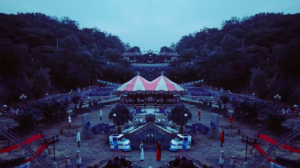
When the album continues, it is deeply surprising to see this ‘twisted fairground’ atmosphere completely evaporate. Across the remaining tracks, we get absolutely solid summer pop-tastic fun in “Airplane”, EDM in “Whistle”, jazzy easy-listening in “Alldaylong” and a delicate ballad in the concluding track, “A Heart of Sunflower”. These songs are undoubtedly a change from the album’s opening mood and signal a clear move from Dreamcatcher’s previous concept-based work in the Dystopia series. Initially, these songs as a collection seem disappointingly random: where is the overarching narrative? How do these tracks fit together?
That is not to say that it is underwhelming, or even unusual, to see a range of genres in Dreamcatcher’s work. In their 2020 album Dystopia: The Tree of Language we saw members Dami, JiU, Siyeon and Yoohyeon contribute to the lo-fi jazz track, the aptly named “Jazz Bar”, and ballads such as 2017’s “Lullaby” and 2019’s “Polaris” testify to their ability to slow it down. And these are only the examples that specifically echo styles on Summer Holiday: throughout their career they have been known for their genre experimentation. Presenting an eclectic range of songs is not surprising from Dreamcatcher, though it does feel strange here on first listen, when such a well-defined atmosphere has been set up.
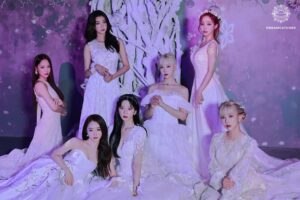
When diving deeper into each individual track, however, it becomes clearer that what we should have been paying attention to in “BEcause” was the combination of play and slick production, rather than the signature rock style. The strongest of the album’s later tracks is the gentle, melodic EDM of “Whistle”. This is a title with an obvious onus to deliver a killer hook—just ask Blackpink—and it does not disappoint. Overlaying a pulsing dance beat and acoustic guitars, the song’s central whistling hook is catchy in and of itself, but the cleverness comes in its intertwining with the vocalists’ singing. This elevates the song from relying on this potentially gimmicky premise, instead allowing the whistle sound to highlight and underline the clarity and power of the vocals.
The retro, eighties easy-listening styling of “AllDayLong” is similarly amplified with the addition of baseline funky bass guitars and echoing synths to match the vocals’ breeziness. The effect is simpler here, but that is the intention of a song like this. The least successful attempts at this fine-tuning of a familiar concept through strong production and creative elements come in “Airplane” and “A Heart of Sunflower”. The latter is certainly not poor, or even lacking in flourishes: Siyeon’s beautifully controlled dip into a low note at the end of the chorus is just one instance of the quality of their vocal stylings.

The production is diamond-perfect ‘summer vibes’, with the eighties synths that bounce along at the song’s close, or the pizzicato effect at the opening, providing tiny connections to other tracks on the album. It’s just that in this instance, the song fails to elevate to the level Dreamcatcher show us elsewhere on the album. It has no flaw per se, but it has nothing to distinguish it from summer releases from other girl groups. This is not what one really expects from a group of this unique a sound.
“A Heart of Sunflower” has the least space to be playful as a classic, slow ballad. However, the arrangement is able to sneak the rock flavour back into the track through the use of electric guitar and gentle drumming. Perhaps it is best to say the ‘play’ here comes in the clear freedom the members are given to flex their singing muscles, soaring into high, clear choruses that never once waver. As a ballad it demonstrates once again the level of accomplishment that this group can achieve in a variety of styles.
So, when we look back at the question of exactly what Dreamcatcher are trying to achieve through Summer Holiday, and how exactly it fits into their greater sound and style, the answer lies in the range on display. There is no doubt that this is an album that, understandably given the title, is working with the lighter genres in the Dreamcatcher playbook. Whilst the opening tracks may seem like a slight misnomer in this regard, it might be best to read it as the group reminding us exactly where their music is usually located, before revelling in taking us off course. Summer Holiday is the lighter, more spirited side of the group’s potential, executed with slickness and musical strength to show us that it’s not the signature sound that makes Dreamcatcher. It’s Dreamcatcher that makes the signature, however they see fit.
[(YouTube). Images via Happyface Entertainment]